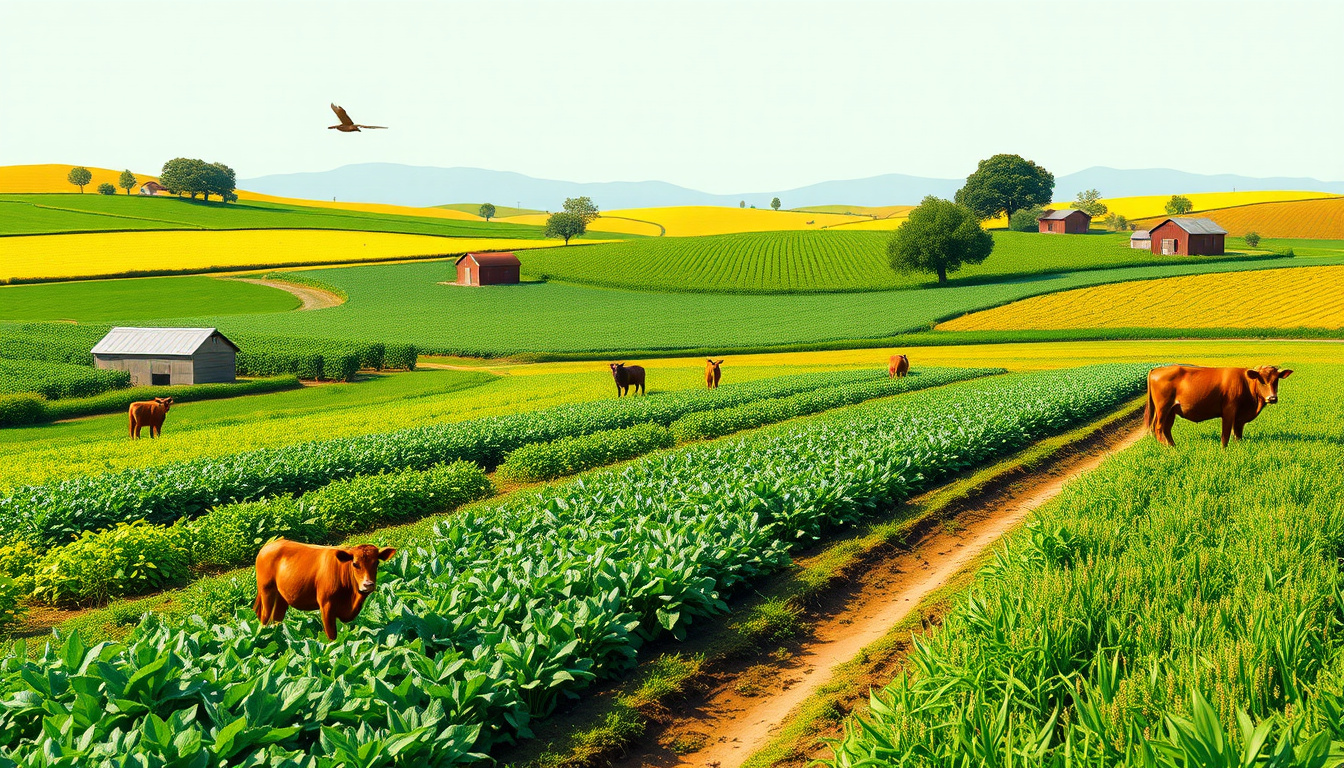Organic Farming Practices and Sustainability

In recent years, the conversation surrounding food production has shifted dramatically, leading to a greater interest in organic farming practices and sustainability. As consumers become more cognizant of the effects of agriculture on the environment, the demand for organic produce is on the rise. Organic farming is not just a method of growing food; it embodies a philosophy that promotes ecological balance and sustainability. This article delves into the fundamental principles of organic farming, explores key practices that define it, discusses its impacts on sustainability, and addresses the challenges and future of organic farming in a changing climate.
https://myfm.co/ffhmag

Ideas to Consider
- Organic farming promotes biodiversity and soil health.
- Key practices include crop rotation, composting, and natural pest control.
- Organic farming contributes to reduced chemical runoff and pollution.
- Challenges include higher labor costs and certification processes.
- The future of organic farming relies on innovation and consumer demand for sustainability.
Introduction to Organic Farming
Organic farming practices and sustainability are becoming increasingly important in today's world as consumers seek healthier food options and environmentally friendly agricultural methods. Organic farming eschews the use of synthetic pesticides and fertilizers, instead relying on natural processes to produce crops. This method not only promotes the health of the soil but also nurtures biodiversity, making it a key player in sustainable agriculture. By employing techniques such as crop rotation, composting, and organic pest control, farmers can create a self-sustaining ecosystem that reduces their carbon footprint and reliance on non-renewable resources. As more consumers become aware of the benefits of organic produce, the demand for sustainable farming practices will continue to rise, making organic farming a prosperous avenue for the future of food production.
Key Practices in Organic Farming
Organic farming practices play a pivotal role in promoting sustainability and environmental health. By avoiding synthetic fertilizers and pesticides, organic farmers focus on cultivating crops using natural inputs and biodiversity. One of the key practices in organic farming is crop rotation, which helps maintain soil fertility and prevent pest buildup. Additionally, organic farming relies on composting and cover cropping to enhance soil structure and improve water retention, thereby reducing the need for irrigation. Integrating livestock into crop systems can also aid in nutrient cycling and provide natural pest control. These methods not only support the ecosystem but also promote a healthier food supply. Embracing organic farming practices aligns with the principles of sustainability, as it prioritizes the well-being of the environment, fostering a resilient agricultural system that can withstand climate change and preserve biodiversity for future generations.
'Sustainable agricultural practices, including organic farming, are vital for the future of our planet. They enhance biodiversity, improve soil health, and reduce the ecological footprint of farming.' - Unknown

Impact of Organic Farming on Sustainability
Organic farming practices and sustainability are inextricably linked, as the principles of organic agriculture focus on enhancing ecological balance and promoting resource conservation. Through methods such as crop rotation, composting, and the use of natural pest control, organic farms reduce reliance on synthetic chemicals, thereby preserving soil health and preventing water contamination.
These practices not only improve biodiversity and aid in carbon sequestration but also foster community resilience against climate change. By prioritizing sustainable farming techniques, organic farmers contribute to the overall health of the planet, ensuring that agricultural practices can meet current food production needs without compromising future generations' ability to do the same. Ultimately, embracing organic farming practices can play a pivotal role in driving a sustainable agricultural revolution, aligning with global goals for environmental conservation and sustainable development.
Challenges and Future of Organic Farming
Organic farming practices and sustainability have garnered significant attention in recent years as consumers become increasingly aware of the environmental and health impacts of conventional agricultural methods. However, despite its numerous benefits, organic farming faces several challenges that impede its widespread adoption.
These challenges include higher production costs, limited access to organic inputs, and the necessity for more extensive labor. Furthermore, many farmers may struggle with the transition period from conventional to organic farming, which can lead to reduced yields during the initial years.
Nevertheless, the future of organic farming is promising, fueled by advancements in agroecological research and technology. Efforts to develop better pest management techniques, improve soil health, and increase organic crop diversity are paving the way for more sustainable practices. As institutions and consumers continue to advocate for the environmental benefits of organic farming practices, we can expect a gradual shift towards more sustainable agricultural models that harmonize productivity with ecological integrity.
Frequently Asked Questions
What are organic farming practices?
Organic farming practices refer to agricultural methods that seek to produce food without the use of synthetic fertilizers, pesticides, or genetically modified organisms (GMOs). These practices emphasize soil health, biodiversity, and ecological balance.
How does organic farming impact sustainability?
Organic farming enhances sustainability by promoting soil preservation, reducing pollution, conserving water, and supporting biodiversity. It fosters a healthier ecosystem and can contribute to climate change mitigation by sequestering carbon in the soil.
What are some key practices used in organic farming?
Key practices in organic farming include crop rotation, cover cropping, composting, use of natural pest control methods, and minimizing tillage. These practices help maintain soil fertility and control pests without harmful chemicals.
What challenges does organic farming face?
Organic farming faces challenges such as higher production costs, stricter certification processes, and the need for consumer education. Additionally, organic farmers may struggle with pest management and soil fertility in certain regions.
What is the future of organic farming?
The future of organic farming looks promising as consumer demand for organic products continues to grow. Advancements in organic farming techniques, along with greater awareness of sustainability, may lead to more widespread adoption and innovative practices.


